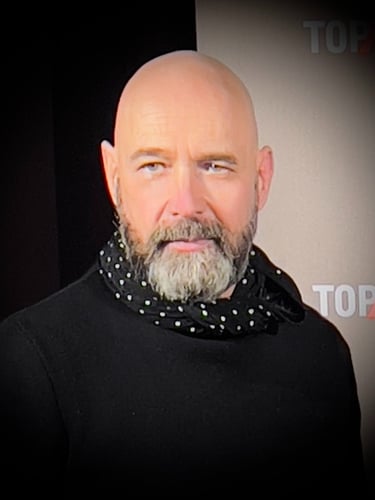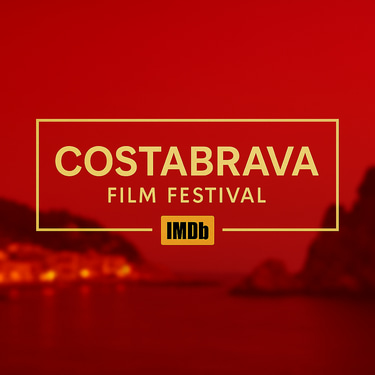INTERVIEW with Patrice Masini
It’s 8 p.m. Just as she’s about to leave her apartment, Lise, a freelance graphic designer, receives a phone call from her father. Nothing extraordinary so far... except that he has been dead for two years. He calls to invite her to his birthday. He talks as if nothing happened. Alone in her apartment, she falters. An absurd conversation begins : funny, tender, and deeply out of sync. Very intrusive, Lise’s father once again wants to keep control and pull his daughter back into his world. Lise struggles not to become her “daddy’s little girl” again. As the dialogue unfolds, the boundaries between the living and the dead start to blur.



Interview with Patrice Masini, director of Quand ils passent
How long have you been making films? How did you decide to get started?
I come from documentary filmmaking. I spent years filming real life, people, their stories, their scars. Then one day, I felt the urge to step through the looking glass. Fiction offers a different kind of truth, the kind we choose to tell. Quand ils passent is my first fiction short, but I approached it with the same sincerity I bring to my documentaries: a quest for authenticity through emotion.
Why did you make this film?
This project was born from an original idea by Natacha Drion, my friend of 15 years. Her imagination, creativity, and personal story with her father inspired the premise: a woman receives a phone call from her father who has been dead for two years. We wanted to write a fiction script together, a first for both of us. Natacha brought the emotional universe, and I worked on the dialogue, structure, and pacing. It was a true creative collaboration.
We rarely talk about death directly. I wanted to explore grief with tenderness, humor, and strangeness. And Pierre Richard said yes. When a 91-year-old cinema legend agrees to be in your film, you jump in. More than 70 movies…
Generative AI became a natural part of the process. It helped me portray memory, inner chaos, and layered fragments of time. Inside Lise’s mind, everything overlaps. That’s what I wanted to convey.
What was the budget? Was it self-funded?
Yes, the film was self-produced and funded through a crowdfunding campaign. It allowed us to pay everyone involved. A collective effort. The budget was modest (25 000 €), but I had a skilled and creative team. And one belief: when money is scarce, poetry takes over.
How long did it take from idea to final film?
Nine months. It was a short but intense journey, with back-and-forth between writing, prep, shooting, and post-production. AI was present at every step, but as I like to say: AI alone is like ketchup. You don’t eat ketchup by itself. Without human vision and intention, it’s bland. It feels artificial and says nothing.
Are you satisfied with the result?
Yes, deeply. The film stands, it resonates, it moves people. Natacha’s performance as Lise, fragile, inhabited, and full of strength, still touches me deeply. And Pierre Richard is moving, funny, disarming, in a performance that feels like a final cinematic gesture.
I’m proud to have edited the film myself. That’s where everything comes together, the rhythm, tone, emotional tension. It allowed me to shape the narrative with precision, keeping it fluid, focused, contemplative, and tense when needed.
I also took great joy in designing the sound and composing the original music. It gave the film a unique atmosphere, balancing between sci-fi and psychological drama. Sound here is not just decoration, it is narrative, emotional, sensory. It defines the identity of the film and adds to its poetry.
Your influences?
Kubrick, Tarantino, Lynch, Sergio Leone, Godard, Dupontel, Michel Hazanavicius, Monty Python, Orson Welles, Jean-Pierre Melville, and of course Pierre Richard. A constellation of strong, singular voices.
Your favorite film or series?
Films: The Shining, Once Upon a Time in America, Pulp Fiction, Breathless, Blue Velvet, Mulholland Drive, Apocalypse now, À bout de souffle, Le mépris, Le Samouraï… and 3000 others.
Series: Adolescence, Breaking Bad
Do you see yourself making films in five years? Do you have other projects in development?
Yes, absolutely. I’m developing a feature-length version of Quand ils passent, a comedy series about IVF, an international documentary on vasectomy, and a docuseries about digital art.
What do you wish for your future in cinema?
To meet a commercial production company, who will represent and support me. To keep working with talented, creative, funny people. To make comedies, because making people laugh is also a form of resistance.
Your most powerful cinema experience?
There are three. Seeing Le Grand Blond avec une chaussure noire as a child, Pierre Richard left a lasting impression. Watching Apocalypse Now Redux at the cinema with my 22-year-old son, a powerful moment of transmission. And recently, Annette by Leos Carax with my wife, it deeply moved me.
